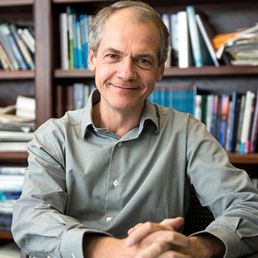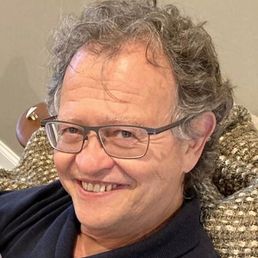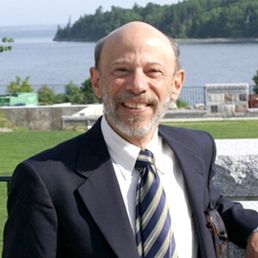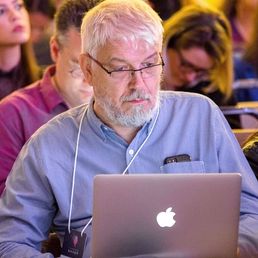
Na rozwój psychoterapii miał wpływ cały szereg innych dziedzin, przez co wielu klinicystów i naukowców wciąż uważa tę dyscyplinę naukową za zbiór niepowiązanych ze sobą teorii. Takie podejście uniemożliwia spójny rozwój psychoterapii i holistyczne traktowanie pacjentów. Podczas webinaru z cyklu EACLIPT, prof. Stefan G. Hofmann z Philipps-University Marburg w Niemczech i Boston University w USA, opowie o psychoterapii zorientowanej na proces, według której problemy ze zdrowiem psychicznym z założenia istnieją jako systemy wzajemnie powiązanych ze sobą elementów.
Po inauguracyjnym wykładzie odbędzie się dyskusja panelowa na temat znalezienia wspólnej płaszczyzny dla psychoterapii opartych na dowodach.
Wykład odbędzie się w języku angielskim.
Spotkanie realizowane będzie na żywo. Udział w nim jest bezpłatny - obowiązują zapisy.
Aby poznać szczegóły spotkania inaugurującego cykl „Webinary EACLIPT” i zapisać się na webinar kliknij tutaj».
The field of psychotherapy has developed from different roots, and many clinicians and scientists still consider psychotherapy as a collection of unconnected groups of theories and associated interventions. This approach prevents a cohesive development of the discipline and a holistic treatment of patients. During the webinar, Professor Stefan G. Hofmann from the Philipps-University Marburg, Germany and Boston University, USA will talk about process-based psychotherapy, which takes the view that mental health problems are assumed to exist as systems of inter-connected elements.
The keynote lecture will be followed by a panel discussion on finding common ground for evidence-based psychotherapies.
To learn the details of the meeting inaugurating the series „EACLIPT Webinars" and to sign up for the webinar, click here».
Prelegent / Speaker

prof. Stefan G. Hofmann – jest profesorem w dziedzinie psychologii klinicznej i translacyjnej Uniwersytetu Philipps-Universität w Marburgu w Niemczech, a także profesorem psychologii na Wydziale Psychologii i Nauk o Mózgu na Uniwersytecie w Bostonie. Był prezesem ABCT i IACP oraz redaktorem naczelnym Cognitive Therapy and Research. Opublikował ponad 400 recenzowanych artykułów w czasopismach i 20 książek. Od 2015 roku znajduje się na liście wysoko cytowanych badaczy Clarivate i Thomson Reuters. Jest także laureatem nagrody im. Profesora Alexandra von Humboldta, a także nagrody im. Aarona T. Becka za znaczący i trwały wkład w dziedzinę terapii poznawczej Akademii Terapii Poznawczej. Jego badania skupiają się na mechanizmach zmiany leczenia, przekładaniu odkryć z neuronauki na zastosowania kliniczne, regulację emocji i kulturową ekspresję psychopatologii. Więcej informacji na stronie: www.bostonanxiety.org.
Stefan G. Hofmann, Ph.D. – is the Alexander von Humboldt Professor of Clinical Translational Psychology of the Philipps-University Marburg, Germany, and also Professor of Psychology at the Department of Psychological and Brain Sciences at Boston University. He has been president of ABCT and IACP, and is editor-in-chief of Cognitive Therapy and Research. He has published more than 400 peer-reviewed journal articles and 20 books. He has been included in list of a Highly Cited Researcher by Clarivate and Thomson Reuters since 2015, among many other awards, including the Aaron T. Beck Award for Significant and Enduring Contributions to the Field of Cognitive Therapy by the Academy of Cognitive Therapy. His research focuses on the mechanism of treatment change, translating discoveries from neuroscience into clinical applications, emotion regulation, and cultural expressions of psychopathology. For more information, see: www.bostonanxiety.org.
Paneliści / Panelists

prof. Professor Jacques P. Barber – jest profesorem i dziekanem w Szkole Psychologii Gordona F. Dernera, dawniej w Instytucie Zaawansowanych Studiów Psychologii na Uniwersytecie Adelphi. Jest emerytowanym profesorem psychologii na Wydziale Psychiatrii oraz w Grupie Podyplomowej Psychologii na University of Pennsylvania. Jest także adiunktem psychiatrii w New York University School of Medicine. Był prezesem Towarzystwa Badań nad Psychoterapią i otrzymał nagrodę za wczesną karierę w 1996 r. oraz nagrodę Distinguished Research Career Award w 2014 r. Otrzymał także nagrodę Distinguished Psychologist Award od Towarzystwa Rozwoju Psychoterapii (Oddział 29, 2018) oraz Nagrodę Naukowego Towarzystwa Psychoanalizy i Psychologii Psychoanalitycznej (Division 39, 2019). Jest licencjonowanym psychologiem klinicznym w Nowym Jorku i Pensylwanii. Jego badania koncentrują się na wynikach i procesie terapii psychodynamicznych i poznawczych dla określonych zaburzeń. Opublikował ponad 280 artykułów, rozdziałów i książek z zakresu psychoterapii i osobowości. Wśród jego ostatnich książek znajdują się „Terapia psychodynamiczna: przewodnik po praktyce opartej na dowodach” (2010) i „Praktykowanie terapii psychodynamicznej: podręcznik przypadku” (2014), obie z Richardem Summersem. Najbardziej dumny jest ze studentów i doktorów, których mentorem był w swojej karierze.
Professor Jacques P. Barber, Ph.D., ABPP – is Professor and Dean at the Gordon F Derner School of Psychology, formerly the Institute of Advanced Studies in Psychology at Adelphi University. He is Emeritus Professor of Psychology in the Department of Psychiatry and in the Psychology Graduate Group at the University of Pennsylvania. He is also Adjunct Professor of Psychiatry at New York University School of Medicine. Among his honors, he is past President of the Society for Psychotherapy Research and recipient of its early career award in 1996 and its Distinguished Research Career Award in 2014. He received the Distinguished Psychologist Award from the Society for the Advancement of Psychotherapy (Division 29, 2018) and the Research Award from the Society for Psychoanalysis and Psychoanalytic Psychology (Div 39, 2019). He is a licensed clinical psychologist in New York and Pennsylvania. His research focuses on the outcome and process of psychodynamic and cognitive therapies for specific disorders. He has published more than 280 papers, chapters and books in the field of psychotherapy and personality. Among his recent books are “Psychodynamic Therapy: A Guide to Evidence-Based Practice” (2010) and “Practicing Psychodynamic Therapy: A Casebook” (2014), both with Richard Summers. He is mostly proud of the students and post docs he has mentored during his career.

prof. Bruce E. Wampold – zdobywca tytułu Emeritus Professor z Psychologii Poradnictwa na Uniwerystecie w Wisconsin — Madison i były dyrektor Instytutu Badawczego w Modum Bad Psychiatric Centre w Norwegii. Jest członkiem American Psychological Association (Divisions 12, 17, 29, 45), posiada certyfikat Board Certified z Psychologii Poradnictwa nadany przez American Board of Professional Psychology. Otrzymał nagrodę Distinguished Professional Contributions to Applied Research Award przyznaną przez Amerykańskie Towarzystwo Psychologiczne, nagrodę Distinguished Research Career Award 2015 od Towarzystwa Badań nad Psychoterapią oraz Złoty Medal 2019 za całokształt osiągnięć w stosowaniu psychologii od Amerykańskiej Fundacji Psychologicznej. Jego pracę podsumowuje Wielka debata psychoterapeutyczna: dowody na to, co sprawia, że psychoterapia działa (z Z. Imelem, Routledge, 2015), która obejmuje rozumienie psychoterapii z perspektywy empirycznej, historycznej i antropologicznej. Obecnie koncentruje się na podnoszeniu jakości usług w zakresie zdrowia psychicznego poprzez świadome ćwiczenie umiejętności terapeutycznych stosowanych przez najskuteczniejszych terapeutów.
Bruce E. Wampold Ph.D., ABPP – is Emeritus Professor of Counseling Psychology at the University of Wisconsin—Madison and former Director of the Research Institute at Modum Bad Psychiatric Center in Norway. He is a Fellow of the American Psychological Association (Divisions 12, 17, 29, 45), is Board Certified in Counseling Psychology by the American Board of Professional Psychology, and is the recipient of the 2007 Distinguished Professional Contributions to Applied Research Award from the American Psychological Association, the 2015 Distinguished Research Career Award from the Society for Psychotherapy Research, and the 2019 Gold Medal Award for Life Achievement in the Application of Psychology from the American Psychological Foundation. His work is summarized in The Great Psychotherapy Debate: The Evidence for What Makes Psychotherapy Work (with Z. Imel, Routledge, 2015), which involves understanding psychotherapy from empirical, historical, and anthropological perspectives. Currently he is focused on improving the quality of mental health services by using deliberate practice of therapy skills used by the most effective therapists.

prof. Paul Salkovskis – dyrektor w Oksfordzkim Centrum Zdrowia Psychicznego. Więcej informacji».
Professor Paul Salkovskis – Oxford Centre for Psychological Health. More information».













